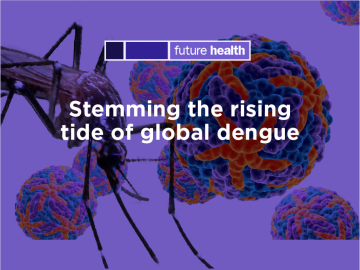Malaria Consortium calls for urgent action to stem the rising tide of global dengue
15 June 2020
This ASEAN Dengue Day, Malaria Consortium is delighted to announce the publication of a timely opinion paper on the world’s fastest growing vectorborne disease.
Dengue is on the rise, rapidly and widely across the planet, and will in time overtake malaria as the number one global public health threat transmitted by mosquitoes. In this paper, Stemming the rising tide of global dengue, Malaria Consortium calls for increased global commitment and collaboration to target the escalating threat.
Dengue is spread via the bite of an infected mosquito, principally Aedes aegypti. The infection causes a flu-like illness and can develop into a potentially lethal complication called severe dengue. There is currently no vaccine to prevent or drugs to treat the disease.
Approximately half of the world’s population is at risk – 30 times more than 50 years ago –and the rate of annual increase is alarming. Today, around 390 million people contract the viral infection every year and children under the age of 10 are most vulnerable. The scale of the problem not only has significant health implications but has a huge economic cost too: communities cannot prosper when sick children cannot attend school and their parents cannot work.
As a leading technical organisation specialising in the prevention, control and treatment of malaria and other communicable diseases such as dengue, Malaria Consortium is calling for urgent action. A greater focus on international, cross-sectoral collaboration and coordinated global strategies are needed to reverse the escalating rates of dengue infection.
Based on its technical expertise and experience supporting community-led vector control activities, Malaria Consortium outlines in this opinion paper five steps urgently needed:
Read the five steps and the rest of the paper.
This paper is the fourth in Malaria Consortium’s ‘Future Health’ series, in which the organisation is using its expertise and experience of running health intervention programmes around the world to share its opinions on some of the biggest threats and developments in global health. Other publications in the series focus on AMR, vaccines and climate change and a paper on digital health will be published later in the year.
To read Stemming the rising tide of global dengue, click here
Access all of Malaria Consortium’s Future Health content here
Latest news
- International summit calls for AMR accountability in public health interventions21st March 2024
- Global SMC community celebrates new milestone at SMC Alliance Annual Meeting in Nigeria6th March 2024
- Scaling up key interventions could halve pneumonia-related childhood mortality13th February 2024
- Malaria Consortium and eGov Foundation join Mozambique’s national malaria programme to digitalise seasonal malaria chemoprevention campaigns8th February 2024
- World’s first malaria vaccine rollout launched in Cameroon22nd January 2024
- Digital solutions driving equitable access to health6th December 2023